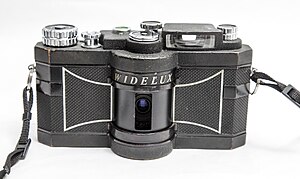Widelux
This article needs additional citations for verification. (May 2009) |
 Widelux model F7 | |
| Overview | |
|---|---|
| Maker | Panon Camera Shoko |
| Type | Swing-lens Panoramic camera |
| Intro price | About US$750 in 1988[1] |
| Lens | |
| Lens | 26mm pivoting lens |
| F-numbers | 2.8, 4, 5.6, 8 and 11 |
| Sensor/medium | |
| Film format | 35mm |
| Film size | 24mm x 56mm |
| Focusing | |
| Focus | Set at 5-6 feet |
| Exposure/metering | |
| Exposure | 1/15, 1/125, 1/250 |
| Exposure metering | No |
| Flash | |
| Flash | No |
| Shutter | |
| Shutter speeds | 1/15, 1/125, and 1/250 |
| Viewfinder | |
| Viewfinder | Yes |
| General | |
| Made in | Japan |

The Widelux is a fully mechanical swing-lens panoramic camera first developed in Japan in 1958,[2] by Panon Camera Shoko. There are both 35mm and medium-format models. Instead of a shutter, the camera has a slit that exposes the film as the lens pivots on a horizontal arc. This pivot allows for some distortion effects not available with traditional cameras. The last Widelux model F8 ended production in 2000.[2]
Models
[edit]Widelux F series 35mm
[edit]- Widelux FI (1959) with Vistar f/2.8 26mm
- Widelux FV (1959) with Panon f/2.8 26mm
- Widelux FVI (~1964)
- Widelux F6 (~1970)
- Widelux F6B (~1970s)
- Widelux F7 (1979–1988)
- Widelux F8 (1988–2000)
Medium format model 1500
[edit]The medium format Widelux model 1500 make 50x122 mm frames on 120 film, and cover a 150-degree horizontal angle across the long side. It was described as newly introduced in 1988 and cost "about US$4,500" at the time.[1]
Differences
[edit]The core difference between the F models is improvements in the gearing. The only other noteable difference is, up to the F6 model, the camera's three shutter speeds were 1/5, 1/200 and 1/50, whilst from the F6B model onwards, the cameras used the more modern speeds of 1/15, 1/125 and 1/250.[3]
There are important differences between the F and 1500 series cameras. The 35mm cameras have a set focus (5 ft to infinity), whereas the 1500 Widelux can focus from a bit less than 1m to infinity with seven markers. The 1500 Widelux also used different shutter speeds of 1/8, 1/60 and 1/250 of a second. The F series cover a 140 degree view, whereas the 1500 series covers a slightly wider area (150 degree view-diagonally-140 degr.horizontally). Finally, the 1500 Widelux, like most manual film cameras, has a shutter that must be cocked before the camera will fire. When setting focus below 5m on Widelux 1500 the resolution will be reduced due to optical limitations.
Notable users
[edit]Actor/photographer Jeff Bridges started photographing movie sets with the camera in 1984. In 2003, he published a book of his panoramic pictures called simply "Pictures".[4] Bridges was recognized for his Widelux photography by the International Center of Photography's Infinity Award in 2013.[4]
A few of filmmaker Stanley Kubrick's Widelux photos appear in the book "Stanley Kubrick: A Life in Pictures" by his wife Christiane.[5]
NASA used the Widelux in the 1960s for its 140° coverage, most notably on the Gemini 5 mission.[6]
WideluxX revival
[edit]During a podcast interview with photography magazine Silvergrain Classics in 2020, actor Jeff Bridges first brought up the idea of reviving the Widelux back into production. This discussion eventually evolved into Silvergrain and Bridges forming a company with the sole purpose of bringing back the camera.[7] To separate the new model they have rebranded it to "WideluxX".[7]
Little is known about the new model. Though Silvergrain originally intended to duplicate the old model, most of the new design had to be built from the ground up as the camera's first manufactuer lost all the original designs in 2005 due to a fire at its headquarters.[8] Silvergrain has just stated that is will be based on the F8 model, but with small "upgrades". They also plan to use no plastic components and only manufacture in German facilities that use green electricity sources.[8] Due to this, it is suspected the pricing will be similar to the Lecia brand (whos factory is also located in Germany), at around $2000 - $6000 USD.
Similar cameras
[edit]Cameras with similar functions include the Noblex and Horizon.
References
[edit]- ^ a b Meehan, Joseph (October 1988). "Superwide: A user's guide to the world of super wide-angle lenses and panoramic cameras". Popular Photography. 95 (10): 56–61, 82–83. Retrieved 3 April 2015.
- ^ a b "Widelux". Camerapedia. Retrieved 3 April 2015.
- ^ "Spennem Photography". Retrieved 6 January 2025.
- ^ a b Estrin, James (30 April 2013). "Lens Blog: The Dude Abides on the Other Side of the Lens". New York Times. Retrieved 3 April 2015.
- ^ Christiane Kubrick (2002). Stanley Kubrick: A Life in Pictures. Retrieved 3 April 2015.
Stanley took this photograph in the Dorchester Hotel ... in early 1965 ... he shot it with one of his favorite cameras: the 35mm Widelux.
- ^ Barton C. Hacker, James M. Grimwood (1977). On the Shoulders of Titans NASA Special Publication 4203. Retrieved 17 September 2024.
- ^ a b "Official Wideluxx Website". Wideluxx. Retrieved 6 January 2025.
- ^ a b "Widelux Revival Project". Silvergrain. Retrieved 6 January 2025.
